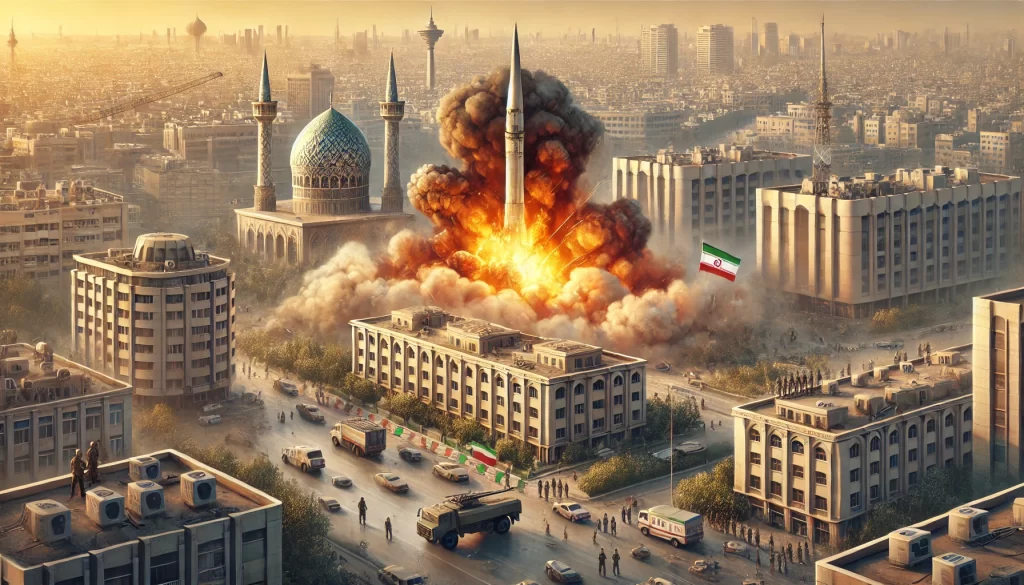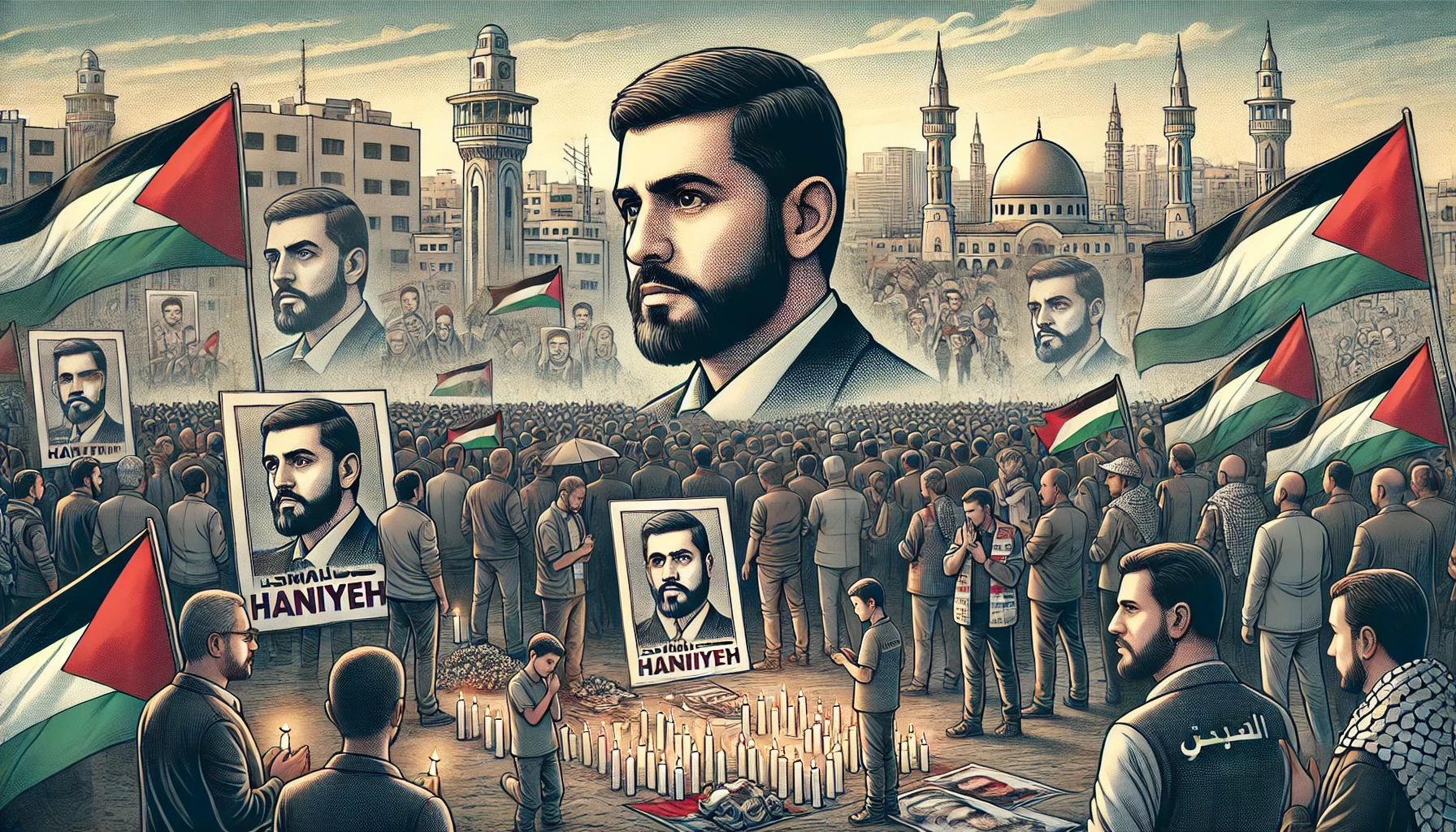Background and Role
Ismail Haniyeh, a key figure in the Palestinian militant group Hamas, was assassinated in Tehran, Iran, at the age of 62. Haniyeh, who was the exiled political leader of Hamas, had been in Iran to attend the inauguration of the new Iranian president, Masoud Pezeshkian. Haniyeh was killed by a missile strike while staying at a guesthouse affiliated with Iran’s Revolutionary Guards. The assassination has heightened fears of retaliation and further escalation in the conflict between Hamas and Israel.
Haniyeh was born in 1962 in the Shati refugee camp in Gaza. His parents had been displaced from their home in what is now the Israeli city of Ashkelon during the 1948 Arab-Israeli war, an event Palestinians refer to as the Nakba, or catastrophe. He studied Arabic literature at the Islamic University of Gaza and became involved in activism against the Israeli occupation. In 1988, he was among the founding members of Hamas, and he participated in the first Intifada, or uprising, against Israeli rule. Over the years, he was arrested several times by Israeli forces and was even expelled to southern Lebanon in 1992 along with hundreds of other Palestinian leaders.
Haniyeh served as the personal secretary to Sheik Ahmed Yassin, one of Hamas’s founders, and eventually rose to become a prominent leader within the group. In 2006, he became the leader of Hamas in Gaza after the group won legislative elections against the rival Palestinian faction Fatah. Under his leadership, Hamas took control of Gaza and governed the territory with an authoritarian approach, often clashing with Israel.
Reactions and Blame
The assassination of Haniyeh has sparked a wave of reactions and accusations. Hamas and Iran’s Revolutionary Guards have blamed Israel for the attack. Hamas’s armed wing stated that Haniyeh’s killing would “take the battle to new dimensions and have major repercussions.” Iran declared three days of national mourning, and Ayatollah Ali Khamenei, Iran’s Supreme Leader, warned that Israel had provided grounds for “harsh punishment.”
Iranian forces have already carried out strikes against Israel earlier in the Gaza war, and the assassination of Haniyeh is expected to further escalate the conflict. In Jerusalem, an Israeli government spokesperson stated that the country was on high alert for any Iranian retaliation. U.S. Secretary of State Antony Blinken, while attending an event in Singapore, emphasized the importance of a ceasefire deal in Gaza to avoid wider regional escalation, but he did not comment directly on Haniyeh’s killing.
International Response
The international community has expressed concern and condemnation over the assassination. Qatar, which has been mediating ceasefire talks along with Egypt, condemned the killing as a dangerous escalation of the conflict. Qatar’s Prime Minister Sheikh Mohammed bin Abdulrahman Al Thani questioned how mediation could succeed when one party assassinates the negotiator on the other side. Egypt also criticized the attack, stating it showed a lack of political will on Israel’s part to calm tensions.

China, Russia, Turkey, and Iraq joined in condemning the assassination, calling for restraint and a political resolution to the conflict. Palestinian President Mahmoud Abbas condemned the killing, and Palestinian factions in the Israeli-occupied West Bank called for strikes and mass demonstrations in response.
Impact on Gaza Conflict
Haniyeh’s death has complicated efforts to reach a ceasefire in the nearly 10-month-old war in Gaza. The war began after a Hamas-led attack on Israel on October 7, which resulted in significant casualties and a severe Israeli military response. Israel launched a ground and air offensive in Gaza, killing more than 39,400 people according to Gaza health officials, and creating a humanitarian crisis for the over 2 million residents of the enclave.
The assassination of Haniyeh, along with the recent killing of Hezbollah’s military commander Fuad Shukr in Beirut by an Israeli airstrike, has diminished the chances of an imminent ceasefire agreement. Hamas’s leadership, both in Gaza and in exile, is facing increased pressure as the conflict drags on with no end in sight.
Legacy and Leadership
Ismail Haniyeh was known for his diplomatic skills and his ability to navigate the political landscape within Hamas and with external actors. He played a central role in Hamas’s evolution over the past two decades, leading the group through multiple wars with Israel and managing high-stakes negotiations, including recent ceasefire talks aimed at ending the conflict in Gaza. Despite being in exile, he remained a significant figure in the movement, often shuttling between Qatar and Turkey to conduct diplomatic activities.
Haniyeh’s death is seen as a significant blow to Hamas, which now faces the challenge of appointing a new leader. Khaled Meshaal, Haniyeh’s deputy who resides in Qatar, is considered the most likely successor. Meshaal, known for his charisma and regional influence, has a history of surviving assassination attempts, including one ordered by Israeli Prime Minister Benjamin Netanyahu in 1997.
Future Prospects
The assassination of Ismail Haniyeh has escalated tensions in the Middle East and posed new challenges for peace efforts in the region. As Hamas and its allies prepare for potential retaliation, the international community continues to call for restraint and dialogue to prevent further violence and instability. The situation remains volatile, with the prospect of a broader Middle East conflict looming large.
This article is based on the following articles:
https://www.nytimes.com/2024/07/31/world/middleeast/ismail-haniyeh-dead.html

Background Information
The Israeli-Palestinian Conflict
The Israeli-Palestinian conflict is a long-standing struggle between Israelis and Palestinians over land and political sovereignty. The roots of the conflict can be traced back to the early 20th century, but it intensified after the establishment of the state of Israel in 1948. This led to the displacement of many Palestinians, an event referred to by Palestinians as the Nakba, or catastrophe. The conflict has resulted in multiple wars, uprisings (Intifadas), and ongoing violence and tension.
Hamas
Hamas is a Palestinian Islamist political and militant group that was founded in 1987 during the First Intifada. The group’s full name is Harakat al-Muqawama al-Islamiya, which means Islamic Resistance Movement. Hamas was created as an offshoot of the Muslim Brotherhood in Egypt and aims to establish an Islamic state in historic Palestine. The organization is known for its social services in Gaza, but it is also recognized for its militant activities, including suicide bombings, rocket attacks on Israel, and tunnel warfare.
Hamas gained political power in 2006 when it won legislative elections against the rival Palestinian faction, Fatah. Following a brief unity government, tensions between Hamas and Fatah erupted into violence, resulting in Hamas taking control of the Gaza Strip in 2007. Since then, Hamas has governed Gaza and has been involved in several conflicts with Israel.
Iran’s Role in the Region
Iran is a major player in Middle Eastern politics and has a significant influence on various militant groups in the region, including Hamas. Iran supports what it calls the “axis of resistance,” which includes groups like Hezbollah in Lebanon, the Houthis in Yemen, and Hamas in Gaza. This support includes financial aid, military training, and weaponry. Iran’s involvement in regional conflicts is often seen as part of its broader strategy to expand its influence and counter the interests of the United States, Israel, and their allies.
The Role of the Revolutionary Guards
The Islamic Revolutionary Guard Corps (IRGC) is a branch of Iran’s armed forces that was established after the Iranian Revolution in 1979. The IRGC is tasked with protecting Iran’s Islamic system and has significant political, economic, and military influence within the country. The Quds Force is a special unit of the IRGC responsible for extraterritorial operations, including supporting allied militant groups like Hamas. The Quds Force plays a crucial role in Iran’s strategy of projecting power beyond its borders.
Key Terms
- Intifada: An Arabic term meaning “uprising.” There have been two major Palestinian uprisings against Israeli occupation: the First Intifada (1987-1993) and the Second Intifada (2000-2005).
- Nakba: An Arabic term meaning “catastrophe,” referring to the displacement of Palestinians during the 1948 Arab-Israeli War.
- Ceasefire: A temporary suspension of fighting, typically as a step towards negotiating a more permanent peace agreement.
- Axis of Resistance: A coalition of anti-Israeli and anti-Western militant groups supported by Iran, including Hezbollah, Hamas, and the Houthis.
Recent Events Leading to Haniyeh’s Assassination
In the months leading up to Haniyeh’s assassination, the conflict between Hamas and Israel had escalated significantly. The war, which began after a Hamas-led attack on Israel on October 7, had resulted in heavy casualties on both sides and severe destruction in Gaza. Efforts to negotiate a ceasefire had been ongoing, with international mediators like Qatar and Egypt attempting to broker peace. However, the assassination of Haniyeh, along with the killing of other militant leaders in the region, has further complicated these efforts and increased tensions.

Debate/Essay Questions
- Was the assassination of Ismail Haniyeh justified?
- What are the potential consequences of Haniyeh’s assassination for the Israeli-Palestinian conflict?
Please subscribe to Insight Fortnight, our biweekly newsletter!
